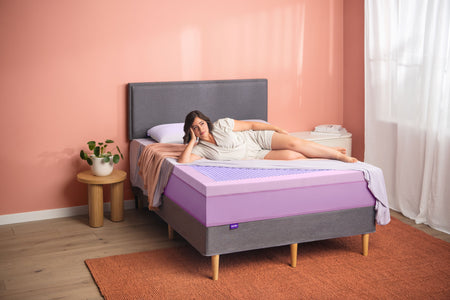There are few things better for your mind, body and soul than a good night's sleep. It affects nearly every aspect of our health and plays a big role in our overall quality of life. Yet for so many of us, getting good sleep can sometimes feel impossible. Since we’ve made improving your sleep our business, we know there are many things that can disrupt a good quality rest.
However, we also know a thing or two about how you can fall asleep quicker, stay asleep longer, and wake up feeling like new. You can upgrade your mattress to one that works with, rather than against, your unique sleep needs. You can freshen up your sleep hygiene. And...you can practice mindfulness.
What is Mindfulness?
Mindfulness is essentially the calm state of mind you can get to by focusing your awareness in the present moment. It involves staying centered in the present, while accepting every thought, emotion and physical sensation that arises.
Mindfulness is a highly effective way to calm down your body and ease your mind into a restful state. Because of that, mindfulness practices such as meditation and yoga are excellent to do before bed. These practices help dissolve stress, reduce tension, and bring your mind into a state of peace.
Thinking of adding mindfulness practices into your nighttime routine, and are curious about how exactly it will benefit you? Here are some of the ways that mindfulness can improve your sleep:
Mindfulness reduces stress (one of the biggest obstacles to good sleep!)
Between work, family life, and the general chaos that comes from being a human in the modern world, stress is pretty much inevitable. And it often has a tendency to seep into our night, keeping us up late and tossing and turning throughout the night. When we practice mindfulness, we are able to ground into the present moment and release the stress that built up over the day. We mentally take ourselves out of the situations that caused the stress earlier, and place ourselves into a place of relaxation and rest. It also helps us to see with greater clarity, perhaps helping us to realize that there is no need to stress at all.
Mindfulness can lower your cortisol and regulate your sleep-wake cycle
Emerging research suggests that mindfulness practices have a direct impact on cortisol levels, and therefore on overall sleep quality. Cortisol is a stress hormone that, when working properly, wakes us up in the morning and slowly decreases as the day goes on. When our cortisol is dysregulated, it's harder to fall asleep and stay asleep. Mindfulness helps regulate your cortisol levels, so you can get your best night's sleep every night.
Mindfulness improves your overall focus and productivity
Mindfulness can be preemptive, too. By increasing your focus and productivity at work, you’ll be able to get more done, leading to less stress. Additionally, some research has suggested that mindfulness allows us to better differentiate between our work and home lives. This helps you keep your work stress in the office, rather than bringing it to bed with you. You can even try a short mid-day mindfulness practice to calm your brain and increase your focus even while at the office.
Mindfulness can treat certain sleep disorders
Mindfulness is an excellent first step in treating mild sleep disorders, as it doesn’t come with any of the side effects that other treatments may have. Several studies have suggested that mindfulness meditation practices have a positive effect on reducing insomnia, increasing sleep quality, and promoting deep sleep. It’s important to note that you should speak to your doctor about any suspected sleep disorders, and that mindfulness should not replace any existing treatment plans.
If you’ve tried everything and are still having sleep troubles, take a look at your mattress. If it’s old or uncomfortable, it can be a lot harder to fall asleep and stay asleep, and the sleep you do manage to get is more likely to be of poor quality. It's important to check in with the state of your mattress on a regular basis to see if it's supporting you, or working against you.
It’s also important to note that sometimes our bodies or lives simply change, and that as they do, our ideal mattress changes too. If you’re finding that you’re uncomfortable or sleeping poorly, it might be time to reevaluate. If you find that you are ready for a new mattress, come visit us at one of Sleep First’s locations, where our sleep experts will be glad to talk through your needs and guide you towards the best mattress for you.












